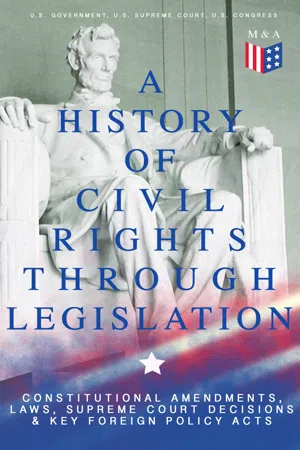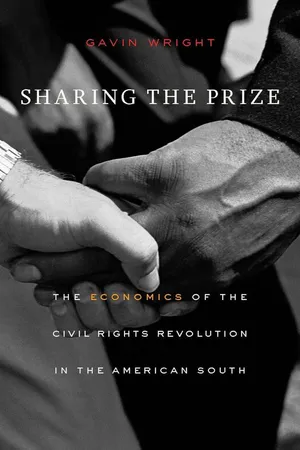Heart of Atlanta Motel v. United States
"Heart of Atlanta Motel v. United States" was a landmark Supreme Court case in 1964 that upheld the constitutionality of the Civil Rights Act of 1964. The case centered on the motel's refusal to accommodate African American guests, arguing that the law violated its rights. The Court ruled that Congress had the authority to regulate private businesses under the Commerce Clause to prevent racial discrimination.
4 Key excerpts on "Heart of Atlanta Motel v. United States"
- eBook - ePub
Civil Rights in America
A Handbook of Legal History
- Daniel H McLinden(Author)
- 2021(Publication Date)
- Universal-Publishers(Publisher)
...I, Sec. 8) to enforce equal rights was another way, besides the 14 th Amendment, to fight racial inequality.] Heart of Atlanta Motel, Inc. v. United States (1964) This case challenged the Civil Rights Act of 1964, the first comprehensive act by Congress on civil rights and race relations since the Civil Rights Act of 1875. For nearly one hundred years segregation thrived under the “separate but equal” doctrine relegating Blacks to inferior accommodations, services, and treatment. Discrimination through private action continued to exist. But Congress’ power over interstate commerce became key to the Court’s decision in the Heart of Atlanta Motel case. The motel was large (216 rooms) and its business relied on local and interstate travelers. Indeed, its guests and its business had a direct effect on interstate commerce. Congress’s power over interstate commerce comes directly from the commerce clause of the Constitution (Article I, Section 8) that authorizes Congress “to regulate Commerce with foreign Nations, and among the several States, and with Indian Tribes.” Title II of the Civil Rights Act of 1964 prohibits discrimination in public accommodations. The owner of the motel sued the government claiming the act violated the commerce clause and he had a right to deny service to Blacks. His case was consolidated with a restaurant case likewise based on a refusal to serve Blacks. The US Supreme Court held that Congress acted well within its authority under the Commerce Clause in passing the Civil Rights Act of 1964, thereby upholding the act’s Title II in question. While it might have been possible for Congress to pursue other methods for abolishing racial discrimination, the way Congress did, according to the Court, was perfectly valid. [Context: Congress, in enacting the Civil Rights Act of 1964, gave people the tools for desegregation...
- eBook - ePub
A History of Civil Rights Through Legislation: Constitutional Amendments, Laws, Supreme Court Decisions & Key Foreign Policy Acts
Declaration of Independence, U.S. Constitution, Bill of Rights, Complete Amendments, The Federalist Papers, Gettysburg Address, Voting Rights Act, Social Security Act, Loving v. Virginia and more
- U.S. Government, U.S. Supreme Court, U.S. Congress(Authors)
- 2017(Publication Date)
- Madison & Adams Press(Publisher)
...Heart of Atlanta Motel, Inc. v. United States (1964) Table of Contents CASE SYLLABUS OPINION OF THE COURT CONCURRING OPINIONS BLACK DOUGLAS GOLDBERG CASE SYLLABUS Table of Contents United States Supreme Court 379 U.S. 241 HEART OF ATLANTA MOTEL, INC. v. UNITED STATES United States District Court for the Northern District of Georgia No. 515 Argued: October 5, 1964 –- Decided: December 14, 1964 Moreton Rolleston, Jr., Atlanta, Ga., for appellant. Archibald Cox, Sol. Gen., for appellees. Mr. Justice CLARK delivered the opinion of the Court This is a declaratory judgment action, 28 U.S.C. § 2201 and § 2202 (1958 ed.) attacking the constitutionality of Title II of the Civil Rights Act of 1964, 78 Stat. 241, 241. In addition to declaratory relief the complaint sought an injunction restraining the enforcement of the Act and damages against appellees based on allegedly resulting injury in the event compliance was required. Appellees counterclaimed for enforcement under § 206(a) of the Act and asked for a three-judge district court under § 206(b). A three-judge court, empaneled under § 206(b) as well as 28 U.S.C. § 2282 (1958 ed.) sustained the validity of the Act and issued a permanent injunction on appellees' counterclaim restraining appellant from continuing to violate the Act which remains in effect on order of Mr. Justice BLACK, 85 S.Ct. 1. We affirm the judgment. OPINION OF THE COURT Table of Contents 1. The Factual Background and Contentions of the Parties. The case comes here on admissions and stipulated facts. Appellant owns and operates the Heart of Atlanta Motel which has 216 rooms available to transient guests. The motel is located on Courtland Street, two blocks from downtown Peachtree Street. It is readily accessible to interstate highways 75 and 85 and state highways 23 and 41...
- eBook - ePub
The Sit-Ins
Protest and Legal Change in the Civil Rights Era
- Christopher W. Schmidt(Author)
- 2018(Publication Date)
- University of Chicago Press(Publisher)
...“The intolerance with which the bill is urged in the name of tolerance” was cause for concern, Krock wrote. He praised Avins for having drawn attention to the liberty costs of the civil rights bill, “a great constitutional issue . .. which has been carefully avoided or strangely neglected.” 49 For all the efforts that Avins, Thurmond, Krock, and the lawyers in Heart of Atlanta and McClung put into the Thirteenth Amendment and other liberty-based constitutional arguments against public accommodations laws, courts easily set them aside. The Supreme Court in Heart of Atlanta Motel dispatched the argument in all of four sentences. In his concurrence, Justice Black gave it a footnote: “The motel’s argument that Title II violates the Thirteenth Amendment is so insubstantial that it requires no further discussion.” 50 The Court was only marginally less dismissive in its treatment of the other possible constitutional bases for the claim of a right to discriminate. It referenced and summarily rejected all claims that Title II infringed constitutional protections of property or liberty. Justice Black did little to hide his irritation with these arguments, which he characterized as claiming “that the broad power of Congress to enact laws deemed necessary and proper to regulate and protect interstate commerce is practically nullified by the negative constitutional commands that no person shall be deprived of ‘life, liberty, or property, without due process of law’ and that private property shall not be ‘taken’ for public use without just compensation.” There was simply no basis to challenge Title II on either due process or takings grounds...
- eBook - ePub
Sharing the Prize
The Economics of the Civil Rights Revolution in the American South
- Gavin Wright(Author)
- 2013(Publication Date)
- Belknap Press(Publisher)
...The Justice Department expected to initiate enforcement actions, but in fact the key test cases were brought by two businesses seeking injunctions against the Act: the Heart of Atlanta motel in Atlanta and Ollie’s Barbecue in Birmingham. Solicitor General Archibald Cox chose to defend the law on the basis of the Commerce Clause of the Constitution. Although this decision was probably made to avoid the need for outright reversal of the 1883 decision overturning the Civil Rights Act of 1875, Cox was able to present considerable evidence that discrimination was damaging to commerce, most immediately by discouraging interstate travel by blacks, but even more substantially by generating racial unrest and protest, thus curtailing business activities, tourism, and the convention trade. 67 Furthermore the Court’s majority opinion (drafted by Justice Clark) explicitly adopted the foregoing analysis of competitive externality to justify the Act’s application to smaller concerns with little direct involvement in interstate commerce, such as Ollie’s Barbecue. Citing testimony before congressional committees, Clark wrote: Racial discrimination by one restaurant in a city encouraged the practice throughout the area because of the other proprietors’ fear of the competitive advantage gained by the segregated restaurant in increased white trade...



